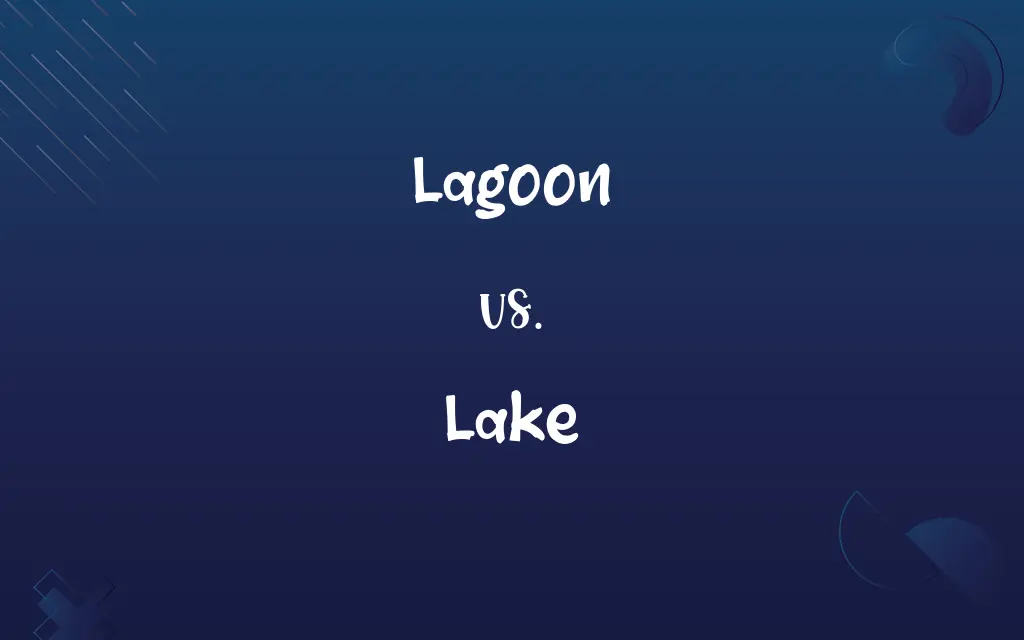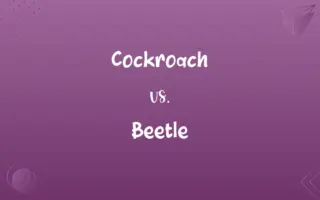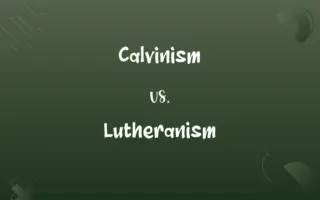Lagoon vs. Lake: Know the Difference

By Shumaila Saeed || Updated on December 25, 2023
A lagoon is a shallow body of water separated from a larger sea by sandbars or reefs, while a lake is an inland body of water, often freshwater, surrounded by land.

Key Differences
Lagoons are coastal bodies of water, often connected to the ocean, characterized by their shallow depth and separation by a barrier like a sandbar or coral reef. In contrast, lakes are inland water bodies, typically freshwater, formed by various geological processes such as glaciation, tectonic activity, or river damming, and are entirely surrounded by land.
Shumaila Saeed
Nov 16, 2023
The formation of a lagoon is usually influenced by marine factors, such as tidal movements and saltwater intrusion, leading to a mix of salt and freshwater (brackish water) in many cases. Lakes, however, are predominantly formed by internal factors like volcanic craters, river sedimentation, or glacial activity, resulting in a predominantly freshwater environment.
Shumaila Saeed
Nov 16, 2023
Lagoons often serve as important ecological zones, providing habitats for a diverse range of marine and bird species, particularly in their shallow, protected waters. Lakes, with their more varied sizes and depths, can support a different range of ecosystems, often including freshwater fish species and serving as crucial water sources for surrounding terrestrial habitats.
Shumaila Saeed
Nov 16, 2023
In terms of human usage, lagoons are frequently used for fishing, aquaculture, and recreational activities, benefiting from their proximity to the sea and relatively calm waters. Lakes are versatile in their uses, including drinking water sources, recreational activities like boating and fishing, and sometimes even hydroelectric power generation.
Shumaila Saeed
Nov 16, 2023
The water quality in lagoons can be more variable, often influenced by oceanic conditions and pollution from coastal activities. Lakes, especially those in remote areas, tend to have more stable water quality, although they can be affected by factors such as runoff, pollution, and climate change.
Shumaila Saeed
Nov 16, 2023
ADVERTISEMENT
Comparison Chart
Water Type
Often brackish, a mix of salt and freshwater.
Predominantly freshwater.
Shumaila Saeed
Nov 16, 2023
Formation
Mainly by marine processes like coral reef growth.
Often by geological activities like glaciation.
Shumaila Saeed
Nov 16, 2023
Ecosystem
Rich in marine and bird species, shallow waters.
Diverse, includes freshwater fish, varies in depth.
Shumaila Saeed
Nov 16, 2023
Human Use
Fishing, aquaculture, recreation.
Drinking water, recreation, hydroelectric power.
Shumaila Saeed
Nov 16, 2023
ADVERTISEMENT
Lagoon and Lake Definitions
Lagoon
Separated from Sea by Barrier
A coral reef forms a natural barrier around the lagoon.
Shumaila Saeed
Nov 16, 2023
Lake
Formed by Natural Processes
The lake was formed thousands of years ago by glacial activity.
Shumaila Saeed
Nov 16, 2023
Lagoon
Brackish Water Habitat
The lagoon's brackish waters are home to unique fish species.
Shumaila Saeed
Nov 16, 2023
Lagoon
Ecologically Rich Zone
The lagoon is a protected area for bird species.
Shumaila Saeed
Nov 16, 2023
ADVERTISEMENT
Lagoon
Shallow Coastal Water Body
The children played near the shore of the shallow lagoon.
Shumaila Saeed
Nov 16, 2023
Lagoon
A shallow body of water, especially one separated from a sea by sandbars or coral reefs.
Shumaila Saeed
Oct 19, 2023
Lagoon
A shallow artificial pond used for treating or storing liquid waste material or for collecting flood waters.
Shumaila Saeed
Oct 19, 2023
Lake
A pigment consisting of organic coloring matter with an inorganic, usually metallic base or carrier, used in dyes, inks, and paints.
Shumaila Saeed
Oct 19, 2023
Lagoon
A shallow sound, channel, pond, or lake, especially one into which the sea flows; as, the lagoons of Venice.
Shumaila Saeed
Oct 19, 2023
Lagoon
A lake in a coral island, often occupying a large portion of its area, and usually communicating with the sea. See Atoll.
Shumaila Saeed
Oct 19, 2023
Lagoon
A body of water cut off from a larger body by a reef of sand or coral
Shumaila Saeed
Oct 19, 2023
Lake
In dyeing and painting, an often fugitive crimson or vermillion pigment derived from an organic colorant (cochineal or madder, for example) and an inorganic, generally metallic mordant.
Shumaila Saeed
Oct 19, 2023
Lake
In the composition of colors for use in products intended for human consumption, made by extending on a substratum of alumina, a salt prepared from one of the certified water-soluble straight colors.
The name of a lake prepared by extending the aluminum salt prepared from FD&C Blue No. 1 upon the substratum would be FD&C Blue No. 1--Aluminum Lake.
Shumaila Saeed
Oct 19, 2023
Lake
A pigment formed by combining some coloring matter, usually by precipitation, with a metallic oxide or earth, esp. with aluminium hydrate; as, madder lake; Florentine lake; yellow lake, etc.
Shumaila Saeed
Oct 19, 2023
Lake
A large body of water contained in a depression of the earth's surface, and supplied from the drainage of a more or less extended area.
Shumaila Saeed
Oct 19, 2023
Repeatedly Asked Queries
What is a lagoon?
A lagoon is a shallow body of water separated from larger seas or oceans by a barrier like sandbars or coral reefs.
Shumaila Saeed
Nov 16, 2023
Are lagoons saltwater or freshwater?
Lagoons can be either, but many are brackish, a mix of both salt and freshwater.
Shumaila Saeed
Nov 16, 2023
Can lagoons be artificially created?
Yes, lagoons can be artificially created for aquaculture or recreation.
Shumaila Saeed
Nov 16, 2023
How do human activities affect lakes?
Pollution, overuse, and climate change can significantly impact lake ecosystems.
Shumaila Saeed
Nov 16, 2023
Can lakes be artificially made?
Yes, lakes can be artificially created through damming rivers or excavation.
Shumaila Saeed
Nov 16, 2023
What is the main use of lakes?
Lakes are used for water supply, recreation, and sometimes for hydroelectric power.
Shumaila Saeed
Nov 16, 2023
How is a lake formed?
Lakes can form through various natural processes, including glaciation, tectonic shifts, or river sedimentation.
Shumaila Saeed
Nov 16, 2023
Can lagoons support marine life?
Yes, lagoons often support diverse marine and bird species.
Shumaila Saeed
Nov 16, 2023
Are all lagoons connected to the ocean?
Most lagoons are connected to the ocean, but some may be isolated during low tides.
Shumaila Saeed
Nov 16, 2023
What's the difference in biodiversity between lakes and lagoons?
Lagoons generally have more marine-influenced biodiversity, while lakes have a range of freshwater species.
Shumaila Saeed
Nov 16, 2023
Is fishing common in lagoons?
Yes, lagoons are often used for fishing due to their rich marine life.
Shumaila Saeed
Nov 16, 2023
Do lakes have a seasonal cycle?
In temperate regions, lakes can have seasonal cycles affecting temperature and ice cover.
Shumaila Saeed
Nov 16, 2023
How do lagoons affect coastal ecosystems?
Lagoons act as buffer zones, protecting coastlines and supporting diverse ecosystems.
Shumaila Saeed
Nov 16, 2023
Are lagoons important for coastal protection?
Yes, lagoons can help mitigate coastal erosion and storm impacts.
Shumaila Saeed
Nov 16, 2023
Do lakes have natural outflows?
Many lakes have natural outflows like rivers or streams, but some do not.
Shumaila Saeed
Nov 16, 2023
Can lakes dry up?
Lakes can dry up due to overuse, drought, or climate change.
Shumaila Saeed
Nov 16, 2023
What causes the salinity in lagoons?
Ocean water inflow and evaporation can increase the salinity in lagoons.
Shumaila Saeed
Nov 16, 2023
Do lakes play a role in climate regulation?
Large lakes can influence local climates, particularly through moisture and temperature.
Shumaila Saeed
Nov 16, 2023
How does climate change affect lakes?
Climate change can alter lake temperatures, water levels, and ecosystem health.
Shumaila Saeed
Nov 16, 2023
What recreational activities are popular in lagoons?
Boating, swimming, and bird watching are popular in lagoons.
Shumaila Saeed
Nov 16, 2023
Share this page
Link for your blog / website
HTML
Link to share via messenger
About Author
Written by
Shumaila SaeedShumaila Saeed, an expert content creator with 6 years of experience, specializes in distilling complex topics into easily digestible comparisons, shining a light on the nuances that both inform and educate readers with clarity and accuracy.









































































